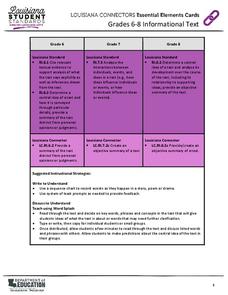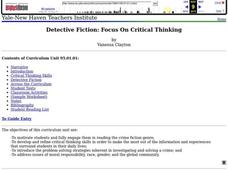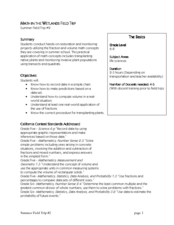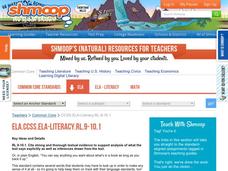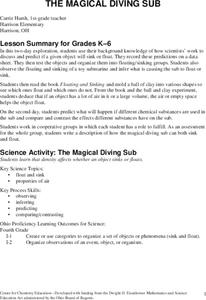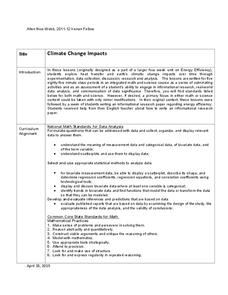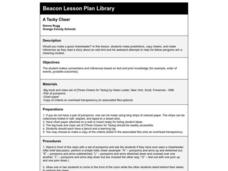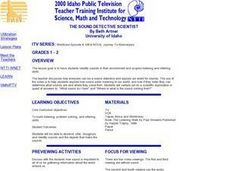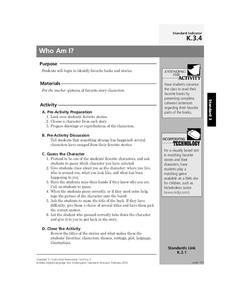UAF Geophysical Institute
Observing the Weather
How can you predict the weather without any technology? Young scientists learn to forecast the weather using traditional Native American techniques. Based on their observations of the weather, as well as talking to their classmates, they...
Curated OER
Unwind: Directed Reading Thinking Activity
To generate interest in reading Neal Shusterman's young adult science fiction novel Unwind, class members engage in a Directed Reading-Thinking Activity (DRTA) that asks them to examine the front and back covers, the blurbs, and "The...
Louisiana Department of Education
Essential Elements Cards
Use essential elements cards to help lesson plan! Each card contains an informational text common core standard for grade levels six through eight and suggestions for activities and supports. Cards address skills such as citing textual...
Curated OER
Detective Fiction: Focus On Critical Thinking
Turn your 6th graders into detectives while growing their love of reading. Using critical thinking skills, they will be able to describe the five basic elements of detective fiction, read detective novels, make predictions, use the...
Curated OER
Heartsongs Poetry by Mattie Stepanek
Use Mattie Stepanek’s Heartsongs book of poetry to inspire young poets to write about their own lives, experiences, and feelings. After reading the introduction to Mattie’s book, in which he talks about himself and his reasons for...
Curated OER
Math in the Wetlands Field Trip
Get your class out in the environment for hands on math activities. In this wetlands lesson, learners transplant native plants, calculate how much soil is needed, and perform math activities based on this experience. They then make...
Curated OER
Let's Put You in a Louisiana University
Considering a college search project? After picking a possible career choice, and determining if that career needs a technical college or university education, individuals examine a wide variety of sources and select three schools...
American Statistical Association
Don't Spill the Beans!
Become a bean counter. Pupils use a fun activity to design and execute an experiment to determine whether they can grab more beans with their dominant hand or non-dominant hand. They use the class data to create scatter plots and then...
Shmoop
ELA.CCSS.ELA-Literacy.RL.9-10.1
Does your ELA class need some practice with the specific skills outlined in the Common Core standards? Then this is the perfect resource for you! One in a series of connected lessons that cover the standards for reading literature,...
Curated OER
Exploring Magnets and Magnetism
Here is a very good lesson on magnets, magnetism, and magnitic fields that is chock full of great activities for you to implement with your young scientists. Learners discover the properties of magnets, look at the forces of attraction...
Curated OER
The Magical Diving Sub
First graders discuss and predict if a given object sinks or floats. They record their predictions on a data sheet. Pupils test the objects and organize them into floating/sinking groups. Students observe the floating and sinking of a...
Curated OER
Medical Explorer
After reading a case study, pupils will explore possible diagnoses, assessment, and treatment plans. Finding the definitions to medical vocabulary and sorting through patient history, they will begin to understand the process of...
Kenan Fellows
Climate Change Impacts
Turn up the heat! Young mathematicians develop models to represent different climates and collect temperature data. They analyze the data with regression and residual applications. Using that information, they make conclusions about...
Curated OER
A Hilly Ride
Different types of energy are the focus of this science resource. Learners identify situations in which kinetic and potential energy are exchanged. They conduct an in-class inquiry which leads them to discover that there is a limit to...
EngageNY
Contrasting Two Settings (Chapter 6: "Lost Melones/Cantalouples")
Continue working through Esperanza Rising, by Pam Munoz Ryan, by looking into language choices and discussing text-dependent questions. Pupils converse in small groups and as a class about plot, setting, and figurative language. Using...
University of Texas
Matter and the Periodic Table Chemical Families and Periodic Trends
Is assembling the periodic table as simple as Tetris? Scholars arrange colored cards into a logical order and then make connections to the arrangement of the periodic table. Hands-on activities include adding trend arrows and analyzing...
Curated OER
The Museum as a Time Capsule: Mongolian Example
Students make defensible inferences based on observation of perceived evidence. They use observation and inference to recognize the validity of alternative approaches or solutions.
Curated OER
A Tacky Cheer
Second graders make predictions, copy cheers, and make inferences as they read a story about an odd bird and his awkward attempts to help his fellow penguins win a cheering contest.
Curated OER
Wig-wag Physics
Learners make observations on the effects of a small, medium and large weight on the movement of a wig-wag apparatus. They use their observations to develop a generalized inference of the effect weight on movement patterns.
Curated OER
Mystery Boxes
Students make observations about Mystery Boxes that their teacher has made up and describes the motion of the object inside the box and hypothesizes it's shape based on their observations.
Curated OER
Traveling With Limited Funds; A Tree Grows in Brooklyn
Students participate in a pre-reading activity which helps them see what it would be like to live in poverty. In this reading comprehension lesson, students make a list of items they take on a trip considering they have very limited...
Curated OER
Why Predict?
Twelfth graders examine the process of predicting. They observe a fine art transparency, discuss their predictions about the artwork, identify the types of predictions made during a weather broadcast, and evaluate headlines from...
Curated OER
the Sound Detective Scientist
Young scholars identify sounds in their environment and acquire listening and inferring skills.
Curated OER
Who Am I?
Students read a story together then choose a favorite character to portray. In this inference lesson, students pretend to be one of the characters in the story, they prepare drawings or actions then present them to the class. Students...
Other popular searches
- Making Inference in Math
- Teaching Making Inference
- Making Inference Handout
- Making Inference Using Art
- Making Inference Worksheet
- Inference and Prediction
- Making Inference Review Game
- Making Inference Lessons
- Lesson on Making Inference
- Making Inference Using Coin
- Making Inference: Reading
- Making Inference Seuss




